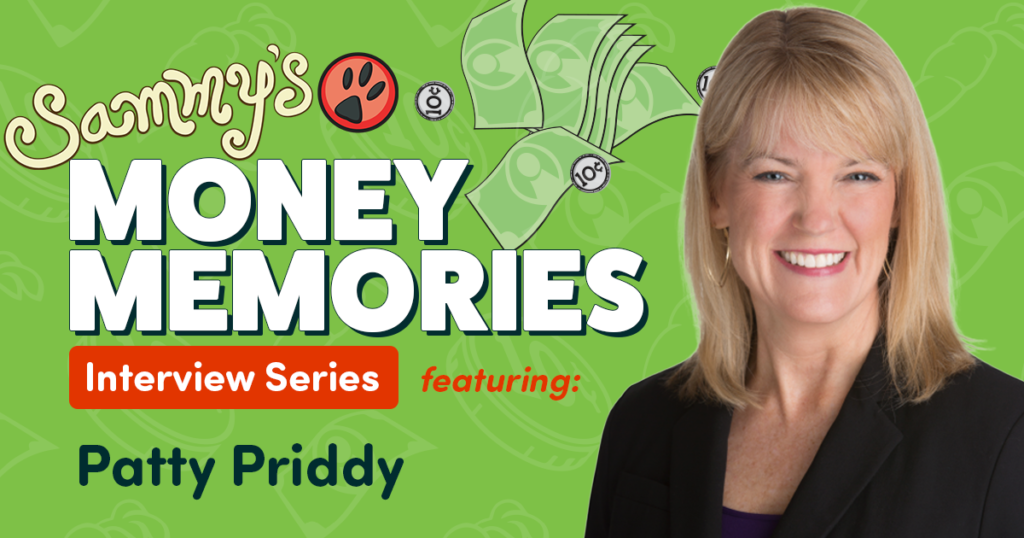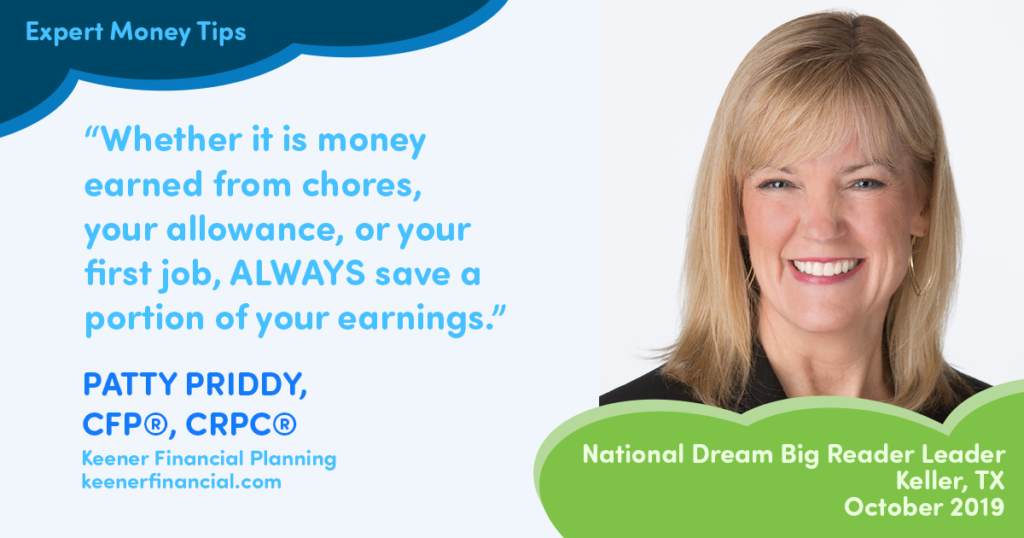
Patty Priddy, CFP®
One critical objective of Sammy Rabbit’s 1st National Dream Big Read Initiative is to raise awareness on the importance of early age financial literacy. We are accomplishing this objective by sharing insights, experiences and money memories from those supporting the endeavor. Today, we are pleased to share Financial Planner Patty Priddy’s insights on kids and money.
Patty graduated from Texas Tech with her MBA, and started her career as a business consultant with one of the large accounting firms. After having children, she worked part time, and remained on the corporate side of finance until her kids were in college. She then decided to make a change. Patty believed she could have a greater impact on people’s lives by becoming a financial planner. She completed her Financial Planning Certification through SMU, and became a CERTIFIED FINANCIAL PLANNER TM.
Since March 2017, Patty has worked at Keener Financial Planning in the Dallas, Fort Worth area in Texas. Priddy, is a member of the Financial Planning Association, Garrett Planning Network, and National Association of Personal Financial Advisors (NAPFA). She works with people of all ages, from early career to retirees.

Take one action today!
Read a child a Sammy story or listen to a Sammy song!
Sam X Renick: This a question I ask everyone. It is the question I asked myself prior to creating Sammy Rabbit and entering the financial literacy industry. If you could only teach a child one money habit, WHAT money habit would you teach them?
Patty Priddy: Whether it is money earned from chores, your allowance, or your first job, ALWAYS save a portion of your earnings. It teaches good saving habits early that will carry on throughout your life.
Renick: What memories do you have related to your first saving experience
Priddy: My parents opened a savings account for me when I was young. Whenever I put money in the account, my dad always showed me how my money was growing.
Read a child Sammy’s Big Dream – Do it today!
Renick: Tell us about your first experience earning money? How old were you? What type of a job was it? How much did you earn? What did you do with the money? What did you learn?
Priddy: My first job outside of the house was when I was sixteen, and worked in the nearby mall. Prior to sixteen, I had “special chores” around the house to earn extra money. My parents had me save half of my earnings to put into a savings account for college.
Renick: What was your biggest money mistake as a child or teenager?
Priddy: I think the biggest mistake was not appreciating the sacrifice my parents made for me to have a good education. I was fortunate my parents paid for a lot of my education expenses, and I didn’t really appreciate it until later in life.
Listen to a Sammy Song – Do it today!
Renick: What was one of the smartest money decisions you made as a child or a teenager and why?
Priddy: I think one of the smartest decisions was not to touch my savings until I needed it for college.
Renick: Did you work while you were in college? Please share a little about how working or not working while attending college affected you, your studies, and personal finance choices including student debt.
Priddy: I worked full time in the summers between semesters in college, and had a few part time jobs in college. It made me really plan my schedule for studying.

Enjoy a Sammy activity – Do it today!
Renick: At around what age did you realize "money was money" or that it had a value? Please share the circumstances or how the realization came about.
Priddy: I really started to see the value of money when I was a teenager. My parents bought the basics, but anything I wanted above that had to be earned. So, when I wanted that new pair of shoes, I either need to do extra chores (when I was young), or work extra hours at the mall.
Renick: Cambridge University research indicates adult money habits are set by age 7. At what age do you believe parents should start teaching kids about money and why?
Priddy: I think parents should lead by example when their children are young. Teach children that delayed gratification is a good thing, that money is a tool to help you in life and should be managed well, but also that money is not the most important thing in life, nor does it define a person.

Renick: Did your parents talk to and teach you about money as a child? Please share a little about your experience on the topic while growing up.
And, if you have children are you talking to and teaching them about money? Please share a little regarding this.
Priddy: My parents taught me about saving, but they didn’t believe in investing. They both grew up during the Depression, and the stock market scared them. I have taught my children about investing, and most importantly, starting early. After they graduated from college and got their first real jobs, the conversation wasn’t if they were going to save into their company 401K and Roth IRAs, but how much.
Have kids build their own Sammy Rabbit Dream Big Journal!
Renick: Why do you think it is important for kids and young people to learn about personal finance (and/or economics)?
Priddy: I think if kids and young people don’t understand the importance of saving early, and the basics for investing, they most likely won’t participate. This will only make it harder to catch up on retirement savings later in life.
Renick: Do you believe personal finance should or should not be taught in schools? Why do you believe there is not more personal finance being taught in schools? Please explain why or why not.
Priddy: I definitely think personal finance should be taught in schools. And honestly, I think it should be a required college course. I really don’t understand why it hasn’t been made a priority.
Teach kids money.
Enroll 1 Child, Class or School Today!
Renick: What is one of your favorite books on personal finance and/or economics? And, is there one lesson that stands out from the book?
Priddy: I really like The Investment Answer by Daniel Goldie and Gordon Murray. It is a quick read, but really drives the point home about staying consistent with your investment plan, regardless of market fluctuations.
To discover more about Patty Priddy, visit Keener Financial Planning at www.keenerfinancial.com

Thank you Patty!!!
Share your childhood money memories and perspective with Sammy Rabbit and his global audience.
Receive valuable exposure. Raise awareness for financial literacy education.
Contact Sammy to learn more.
Contact and Connect with Sammy Rabbit!
Website and Email
If you have questions, suggestions or would like learn more about Sammy Rabbit and his mission to teach kids great money habits and other important life skills, contact us!
CLICK to contact Sammy via our website contact form;
or email us at: contact@SammyRabbit.com
Social Media
Become a Sammy Partner!
Provide your community and network with co-branded Sammy stories, songs & activities!
Let’s collaborate and change children’s lives together!







